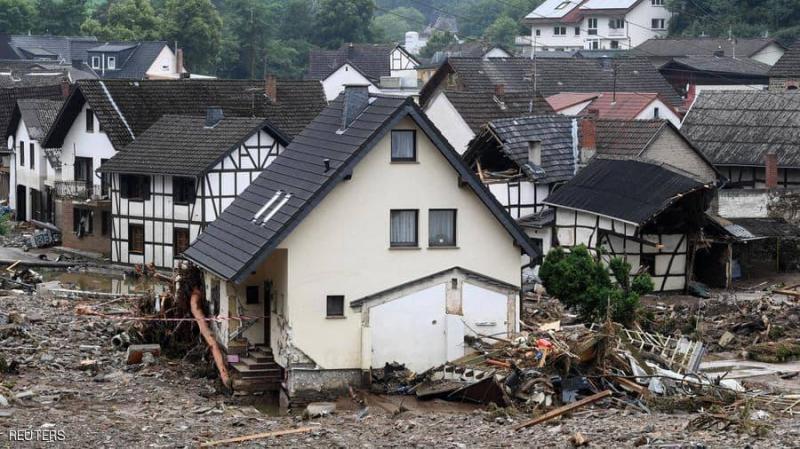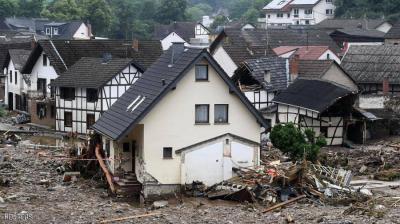Streets engulfed by torrents, blocked roads, isolated areas, and people calling for help from rooftops, while their cars sink beneath water and mud. These are some scenes from one of the worst natural disasters that struck Germany, leaving immense human and material losses. Germany continues to count its dead, as rescue teams search for dozens of people still missing in one of the most violent floods the country has experienced in decades. The floods in Germany have resulted in the deaths of 103 people, according to the latest statistics from authorities, with the toll expected to rise. Villages and towns in the west of the country have become isolated due to road closures and collapsed infrastructure.
The death toll is likely to increase in the coming hours, as rescue operations continue to search for missing persons numbering in the hundreds, particularly in the areas of Westphalia, the Rhine, and Rhineland-Palatinate. Floodwaters have inundated homes and streets in many of the affected towns and villages, leading to power outages for tens of thousands of residents, along with road closures, halted trains, and damaged telephone networks.
Similar to Germany, heavy rains in several countries in Western Europe have resulted in 14 deaths in neighboring Belgium, while causing significant damage to infrastructure in both the Netherlands and Luxembourg.
### Moments of Panic and Fear
A sense of anxiety and panic prevails among the Arab community in Germany and Belgium, and fears are rising about the possibility of a repeat of the devastating floods.
Sophia Meliri, residing in the Belgian city of Liège, reported that heavy rain persisted in the city and surrounding regions for several consecutive days, trapping thousands of residents within their homes due to flooding that swept through the streets. She told "Sky News Arabia": "Hours before the disaster occurred, the police closed the bakery where I work. Many other facilities were also closed in anticipation of any danger posed to residents after the weather deteriorated due to heavy rains."
Sophia confirmed that the rain severely disrupted life in Liège, where public transport ceased, infrastructure was damaged, and the phone network collapsed, preventing people from communicating with their loved ones.
### The Area Turned into a Lake
Fatima, a Moroccan migrant living in Wallonia, southern Belgium, described the situation as tragic, confirming that "the entire area drowned under water and turned into a lake, where about 14 people died by drowning after being trapped and unable to leave their homes."
She added: "It is a true disaster. Many people found no escape other than to climb onto rooftops and high ground to avoid the floods and rushing waters that covered the entire city."
On the other hand, she expressed her immense gratitude and appreciation for rescue teams, praising the efforts they made to support citizens. She said: "They have employed all means and resources. They are using small boats and helicopters and are making great efforts."
Fatima continued: "What we need right now is to protect our children, and we want dry food supplies that can be stored at least until this ordeal is over. I hope we don’t witness more floods in the coming hours."
Photos and videos documenting the state of many streets in western German cities have spread on social media, highlighting the extent of the damage to buildings and infrastructure. Netizens have also used the hashtag "Germany is drowning," sharing updates related to this unprecedented tragedy.
A Twitter user, Hind Yaqub, stated: "Wuppertal has been evacuated due to fears of dam bursts. Leverkusen is submerged in water, and in my old city of Stolberg, I called my neighbor, who says they are trapped and cannot leave the house."
Sarah Al-Omari wrote: "For those who said global warming is not real and floods only happen in poor countries due to inadequate infrastructure, here is Germany drowning in its first disaster from the floods."
Before reassuring his followers about his condition, Moroccan journalist Munsef Slimi, residing in Germany, appeared optimistic, posting on "Facebook": "After two days of floods that caused victims and significant damage, especially in North Rhine-Westphalia and Rhineland-Palatinate, the weather is expected to improve."




